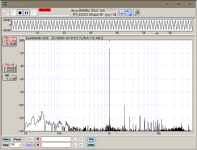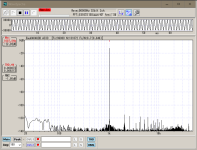Member
Joined 2018
I have designed several types of ADAU1701 boards. Now I can say the ADAU1701 embedded DAC is good enough for most audio applications. (Such as a crossover or Speaker EQ compensation)
The output level can be adjusted to 2Vrms with my circuit design. (Also, the absolute phase corrected)
On the other hand, ADAU1701 embedded ADC has the characteristic of increasing distortion near the full-bit level. It will not be a matter if we use the DIR instead of the embedded ADC. There is one big constraint that exists when using S/PDIF. The ADAU1701 doesn't have ASRC, so the DSP should run with the input source's sampling rates. The cut-off (or turn-over) frequency will change if you switch the fs, such as 44.1kHz/48kHz/96kHz, etc.
FreeDSP Catamaran solved this ADC behavior with a special differential ADC operation. Here are the single-end and differential ADC operation characteristics.
ADAU1701 Single-Ended ADC to Embedded DAC overall Distortion:

AUAU1701 Differential Operated ADC to Embedded DAC overall Distortion

I will say, the differential-operated ADAU1701 ADC performance is more than enough.
If you always play the single Fs, I recommend using the digital input.
CyberPit
The output level can be adjusted to 2Vrms with my circuit design. (Also, the absolute phase corrected)
On the other hand, ADAU1701 embedded ADC has the characteristic of increasing distortion near the full-bit level. It will not be a matter if we use the DIR instead of the embedded ADC. There is one big constraint that exists when using S/PDIF. The ADAU1701 doesn't have ASRC, so the DSP should run with the input source's sampling rates. The cut-off (or turn-over) frequency will change if you switch the fs, such as 44.1kHz/48kHz/96kHz, etc.
FreeDSP Catamaran solved this ADC behavior with a special differential ADC operation. Here are the single-end and differential ADC operation characteristics.
ADAU1701 Single-Ended ADC to Embedded DAC overall Distortion:

AUAU1701 Differential Operated ADC to Embedded DAC overall Distortion

I will say, the differential-operated ADAU1701 ADC performance is more than enough.
If you always play the single Fs, I recommend using the digital input.
CyberPit
Ern, I think you might be confusing yourself by using RMS and max in the same phrasing. It's either/or, not "RMS max". It's-either the RMS rating in volts or max rating in volts.Yes, 0.9 Vrms is the max output. Here's a clarification:
You are correct, the max RMS DAC voltage is 0.9 V. I shouldn't trust my faulty memory. I would still contend that is low compared to many DACs whose outputs are 2 or 4 V RMS max. In the end it just means you need select an amplifier with the correct gain to match the 0.9 V RMS max output.
I think we’re getting tied up in semantics and cluttering up the thread, so I'll send you a message.